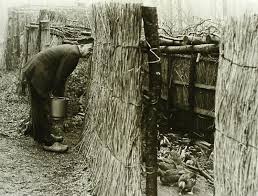Urine specialist: pee was vital in the production of textiles, chemicals and gunpowder. Hence, experts would oversee the quality of the collected precious commodity.
 Leech collector : the easiest procedure was walking into a river with bare legs and letting them suck your blood until they fell off.
Leech collector : the easiest procedure was walking into a river with bare legs and letting them suck your blood until they fell off.
Bowling alley pin setter: teenage job before automation.
Knocker-upper: before alarm clocks they knocked on windows with canes and pea shooters in an attempt to wake up their clients who needed to get to work early.
Log driver: before trucks, they guided freshly cut timber floating down rivers, standing/walking on them.
Toshers someone who scavenges in the sewers to find rich pickings
Mudlarks were dredging the banks of the Thames in the early morning when the tide was out, to pick up anything valuable.
A whipping boy (1600s and 1700s) was assigned to a young prince and punished when the prince misbehaved. They grew up together since birth, they usually formed an emotional bond. And that even made it work.
A gong farmer or gongfermor (Tudor England) removed human excrement from privies and cesspits. Gong is another word for dung. They were only allowed to work at night. The waste they collected was known as night soil. It was used on the farms outside the town.
The stercorarius (Roman times) traveled door to door collecting all the human waste and cart it off to the edge of town. Farmers would buy the dung for their crops. so the Romans had a closed cycle, a better way of dealing with their waste then we now.
The urinatores were salvage divers from Ostia. The name is probably was given because deep diving caused pressure on their abdomens making them urinating a lot. They had but one tool: a kettle shaped diving bell filled with air for breathing and weighed down with lead weights. So they reached up to 30 meters below the surface. Urinatores primarily did salvage but also moved construction equipment around. It was a dangerous job, but well paid. Many became affluent members of Roman society.
Lamp lighters went around lighting or extinguishing street lamps (gas).
Previously, it was better than now, but fortunately that is over. (Piet Theys)
